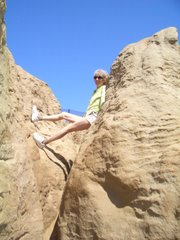Horses are Multi-Lingual!

Reflection # 3
- What is your learning style?
- Living in France when I was ten years old, I found it an adventure, and really don't even remember learning the language consciously, it just came with the air and food +wine, apparently. Having moved every year or two before that time (and afterwards) I was just happy to be somewhere where it was different. (However, this was not true of returning to the US to reside in Arkansas after France!) Thus I conclude that I was, even at that tender age, ambiguity tolerant, and intuitive, just accepting what came and dealing with it the best I could. In language learning I place emphasis on speed (e.g. of vocabulary acquisition) over accuracy, which I figure will come with more exposure, thus indicating I am probably more right-brain oriented, and more FD (big picture, people and psychology, inductive) with enough FI to figure out the details. Impulsivity is a hallmark, how else could I have ended up being kidnapped in Morocco, just pulling up and leaving for Germany for a new opportunity, or leaving a "normal" job to come back to grad school, taking (horse) driving lessons in Hungarian, etc? Probably my major hook into languages is auditory, as I can listen to opera and learn new vocabulary, or to tapes. Imitating people and accents has always been a sideline of mine. Don't ask me to get started . . .
- Have you ever taken a learning style inventory?
- No, but have worked extensively with the Myers-Briggs Personality Evaluation, and I can see some correlations. The inventory is very helpful to further analysis of students.
- In your classrooms as teachers how have you or do you address the issue of learning styles?
- I have done a lot of consulting and one-on-one work with adults and children. In addition, I have worked as a teacher for a seminar company, with the clear objective of delivering "edutainment," with compensation being related to the quality of the lectures presented. In these cases I have used psychological skills to find out what the problems were, often interviewing the seminar attendees before class, and then addressed myself indirectly to these problems, which, once cleared up, opened doors to learning. It is very helpful to have a list of styles to work from, rather than just using my experience and intuition. I believe that this information will also help me in the communication skills project in Electrical Engineering.
- Finally discuss your experience with learners' beliefs about language, of either your students or their parents.
- When children in Germany told me that they couldn't learn English, I would ask them if they were smarter than my horses. When they said yes, I let them know that my mares learned German, and didn't forget their English. Then we would put the horses on a line, and give them commands in both languages, which they understood perfectly. This may not have totally convinced the kids about their own abilities, but they sure admired the language skills of the horses!
- How has it affected your teaching?
- At UTSA, I am blessed to be working in an area which calls on my skills gained in the pharmaceutical industry, and I take pains, when delivering information, to tell the attendees why this is important when they get out into the "real" world.



1 comment:
Hi, Carol.
That is a very thorough answer! Languages are so fun, aren't they? Great picture on the horse! see you in class.
Post a Comment